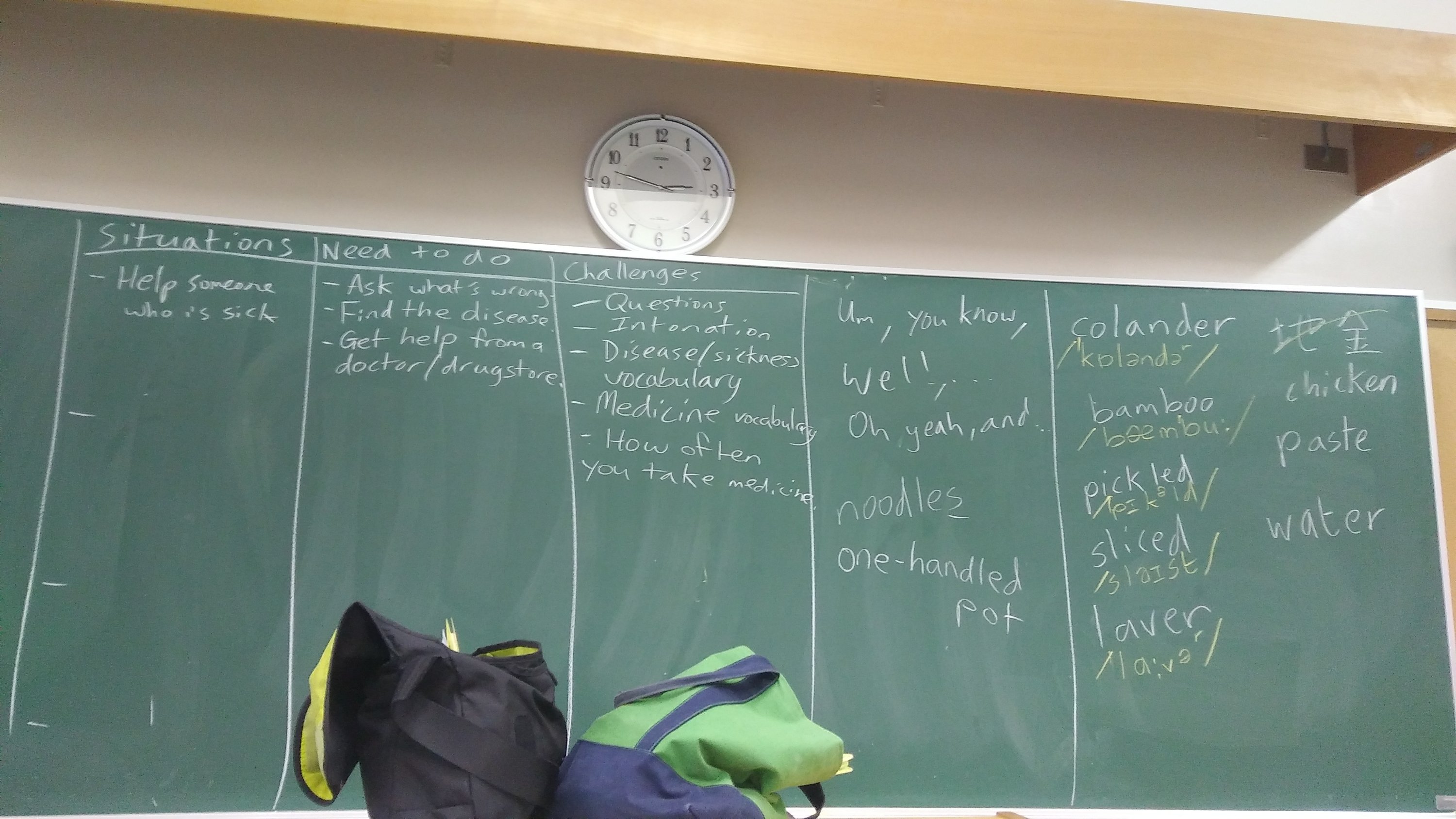You are in a classroom. There is a dais with a desk, behind which there is a blackboard. In front of you there are eight novices awaiting instruction.
I choose to engage the novices.
Go ahead.
Today, I have a plan. However, I am interested to know if you have a different plan. My plan can be for another day. Please imagine different situations that you and Rob or Vanessa (our regular Non-Player Characters) might be in. Use last week’s lesson as a planning guide. If you need help, please ask me.
Roll D10>3 and D4<4 for successful engagement and +1 courage.
D10=7,
D4 falls off desk… =1.
It went really well, actually. The students planned in two groups of 4. One group decided on explaining a road relay (and did very well indeed), and the other planned to teach how to make miso soup, which they underestimated the complexity of, but I see this as a good learning experience. I also think that by giving my students a metaphorical look behind the curtain that they can understand the success criteria for the tasks I create a bit better. I would still like a bit more linguistic complexity in their output, but today I am going to take this as a success.
XP +D6
D6=4.
Read Here be (Dungeons and) Dragons previous ‘chapters’: 1, 2, 3, 4, 5, 6, 7, 8, 9.
Tag: learnercentredness
Managing Monkeys (and Dragons)

Do learners rely too much on teachers to do the ‘heavy lifting’ in the classroom? I’ve had a couple of things happen this week that have had me on this train of thought.
One of my colleagues put me on to Alan Waters’ (1998) article, Managing Monkeys in the ELT Classroom. The monkeys are not learners but the task at hand. Who is dealing with the task, and who should be?
Today, I had a review class with one of my RPG-based classes. It was the worst I have seen them. For a minority of students, when they should have been planning, they were talking about nonsense in Japanese (yes, I eavesdropped). I reset the task, asked to give support, but in the end I can only do so much. Perhaps they thought the task retry was too simple in spite of initially claiming otherwise. Next week, I have students managing proverbial bonobos rather than the capuchins they have had so far: they will control the role playing and the points for the game themselves. They have been given a basic scenario and have to imagine possible events. I shall see what happens next.
Advancing to What Exactly?

I was reading a post by Geoffrey Jordan about whether he should accept an advanced learner for an immersion course, and it got me thinking about the same topic, rather deeply.
I believe in learner-centred teaching, learner autonomy. None of this is astoundingly new, nor is it unorthodox. Some of the hackles raised by the people opposed to it may be that it is tree-hugging hippy crap or they’re tired of people who haven’t seen the inside of a classroom in ten years telling them how they should be teaching. Some of it is “common sense” or “just good teaching”. However, I do think that learners could do a lot more on their own: checking vocabulary, listening practice, reading for pleasure, etc.
In the language school I used to work at, there was also a debate about whether learners could ‘graduate’ from the school. The sales staff thought not; the teachers thought so. The sales staff get money for bums on seats whereas the teachers get the feelgood glow from thoughts of helping learners attain intended proficiency levels. It’s not that simple, though. I do know of organisations that have refused advanced-level students to join classes, though this is more to do with very-advanced-level students intimidating the upper-intermediate learners. I do not know of any that have done so for reasons of fostering learner autonomy. A lot of teachers don’t like to have their learners in too low a level. What if no level is high enough? Other teachers don’t want their students to be in over their head. In that case, how come they don’t have the tools to cope with autonomy at advanced level?
Geoff’s conundrum is whether his learner would benefit (or benefit enough) from the course. In an ideal world he might just curl up with a book, a video, put the radio on, talk to somebody online or write to a friend. However, I do mean ‘in an ideal world’; his learner might not actually be motivated to do it without a teacher there to motivate him. I feel that some of my most motivated learners would read and listen widely even if I didn’t moan at motivate them to.
I see my role as having my learners get to the point where they no longer need me. However, this leads to the issue of who decides. Should the teacher or the learner ultimately decided when they are ready for autonomy? (There is an interesting article by Sara Cotterall about readiness for learner autonomy [PDF].) I hate to feel like I’m saying there’s nothing to learn, but then teaching does not necessarily equate to learning.
Of course, it’s in no teacher’s best interests to turn down money from a willing student. I tend to wonder whether it’s the morality at play; that even if we are not wrong, that we feel bad for taking money when the teaching sometimes feels less intensive or there is less visible, near-immediate learning taking place.
On 'That' Annoying Benjamin Franklin Quote
Somewhere on the internet you have seen it, probably in a ‘viral’ image. It’s attributed to bad-weather kite flier and slave owner Benjamin Franklin, and goes like this:
Tell me and I forget; teach me and I remember; involve me and I learn.
“Ooh, Marc, can you please tell us why this gets on your nerves so much?”
It would be a curmudgeonly pleasure!
-
It is used by teachers to talk about ‘learner centredness’ but dismisses teachers.
-
It smacks of the dreaded Learning Styles hydra that refuses to die.
-
“Teach me and I remember” tells us nothing about the method.
-
“Involve me and I learn” is just baseless.
-
It is also a mistake in attribution and a poorly summarised translation.
While my wife may tell me to clean the bathroom and I may forget, remember that this is not a classroom situation. The classroom is a place for learning. It may be a social construct but it is one that has been reached by some kind of social consensus based on an agreed location. People go there to learn, whether by listening to teachers or watching them or whatever. This whole “Tell me and I forget” essentially negates anything said by anybody in a classroom or anywhere else.
“Tell me and I forget” suggests that Ben Franklin was not an auditory learner. So perhaps he was a ‘naturalistic’ learner, or an ‘experiential’ learner, what with the story of the kite and the thunderstorm. Absolute rubbish! If a bloke is clever enough to wheedle his way to the top of a puritanical yet hypocritical wealth-driven society he’s clever enough to pay attention to what someone is telling him.
Are we teaching through mime? Diagrams? Song? Guided instruction? Ben, someone just told you what to do. Couldn’t you have taken notes? That would definitely help you remember. While multi-modal instruction is useful to really hammer home a point, there is not always time for it.
I’m all for learner-centredness and even moderate a Google Plus community about it. The thing is, you can involve learners in any activity but if it isn’t thought out in a principled way to develop emergent skills (language use or skills in reception) then learners are only learning that busy work and jumping through hoops pleases teachers. It’s why I hate unprincipled use of games in teaching. It’s pure filler!
Like the struggle against pseudo-Einstein by Russ Mayne, the Franklin quote is likely not to come from Franklin at all. It’s just a snappy soundbite badly translated from Chinese.
So, that’s why. I must state that this is not a post to say that you are a bad person if you have shared this quote. You may have used it to support an argument about learner-centred classes versus a droning teacher and a PowerPoint. However, you’d be better of not supporting your argument with an incorrect attribution when there’s a perfectly good Chinese quote to support your view.